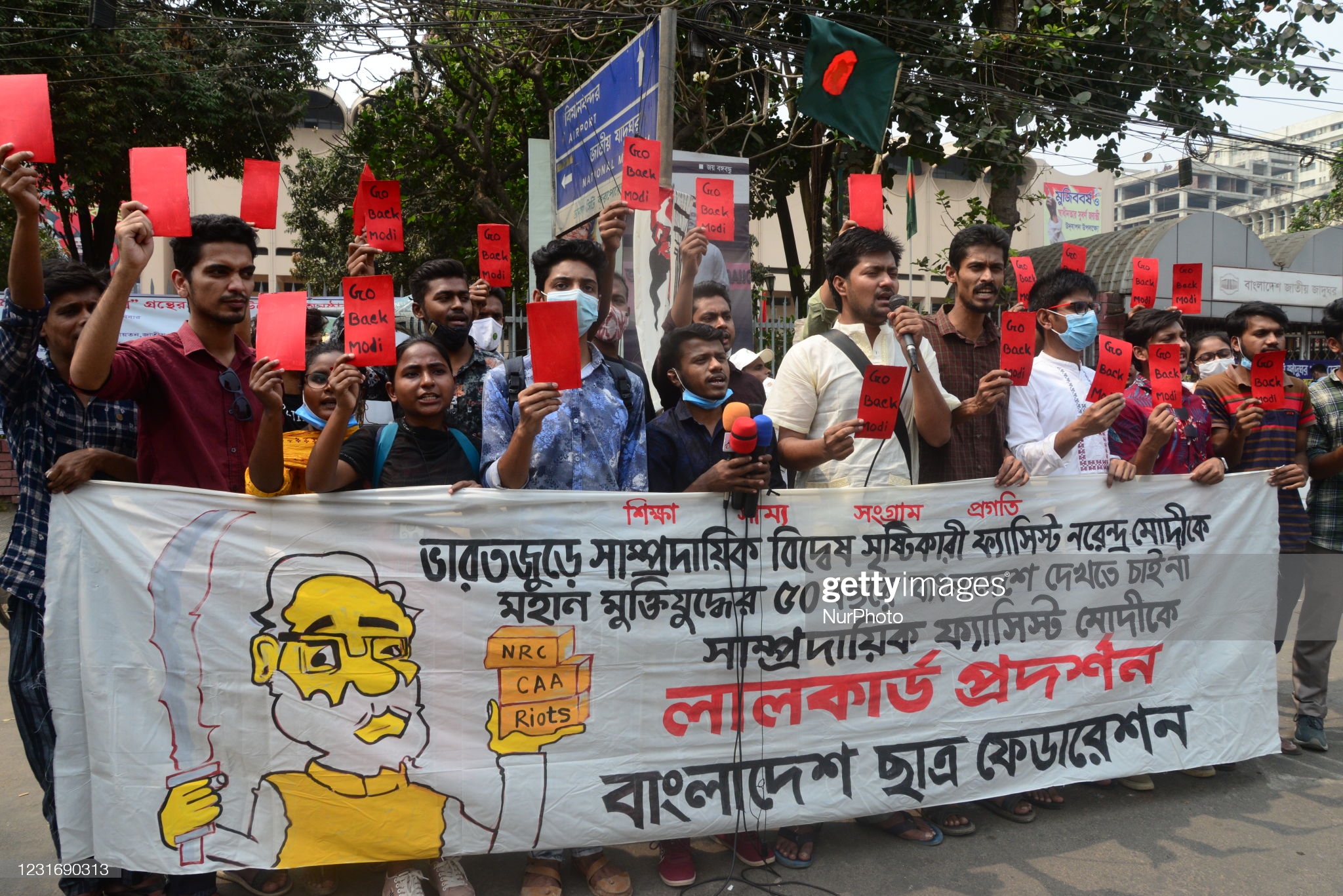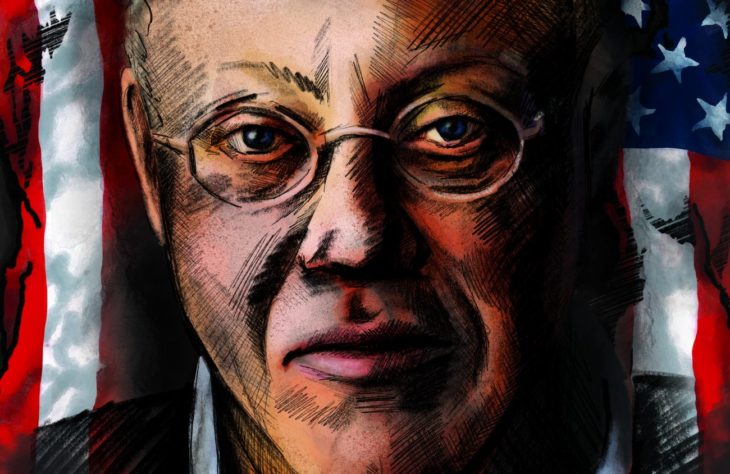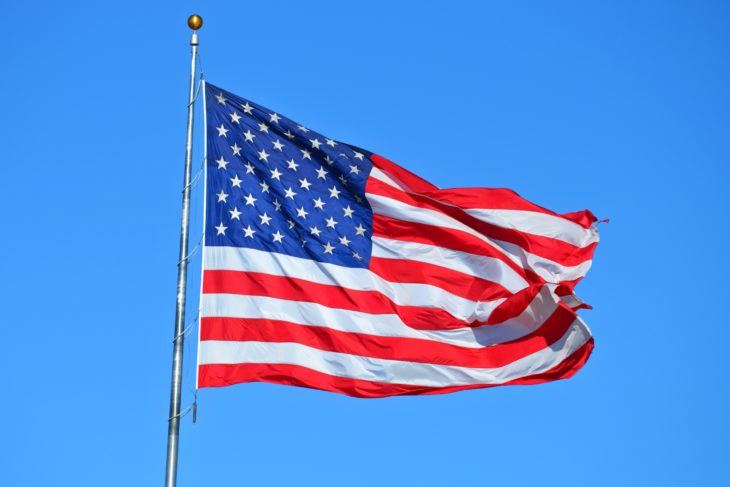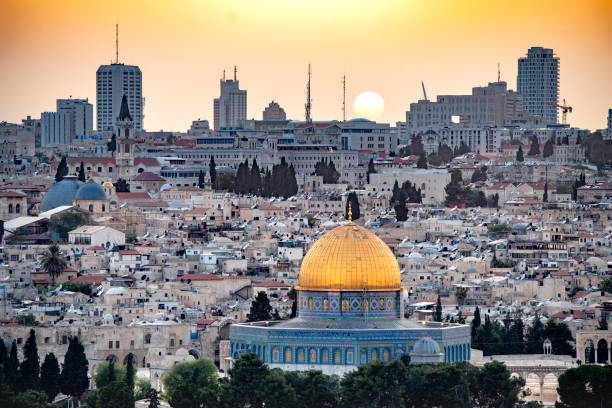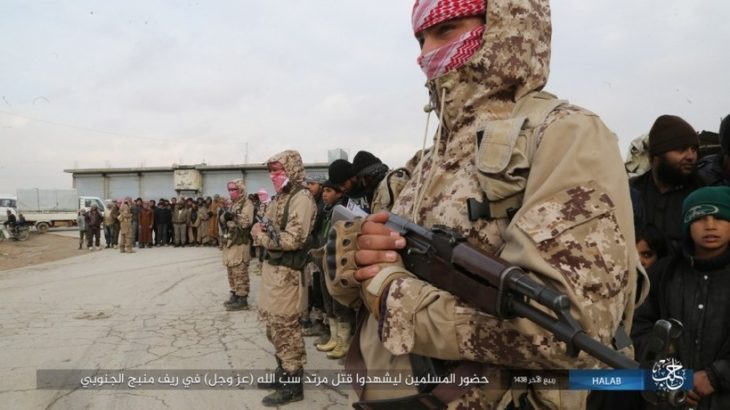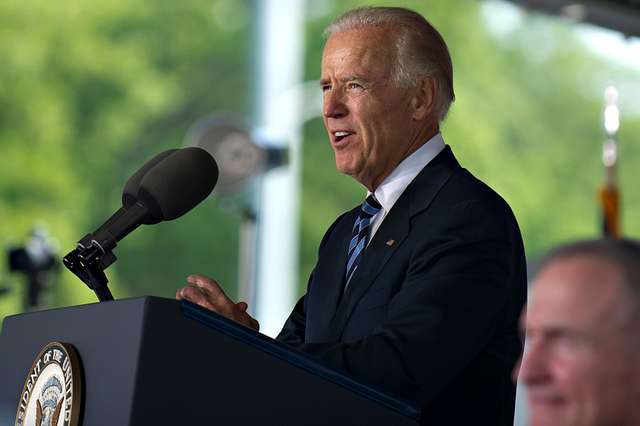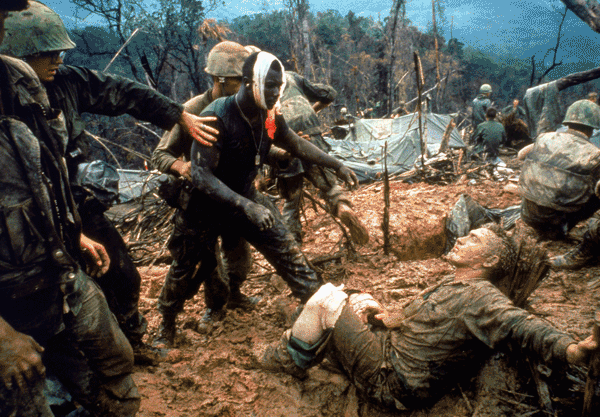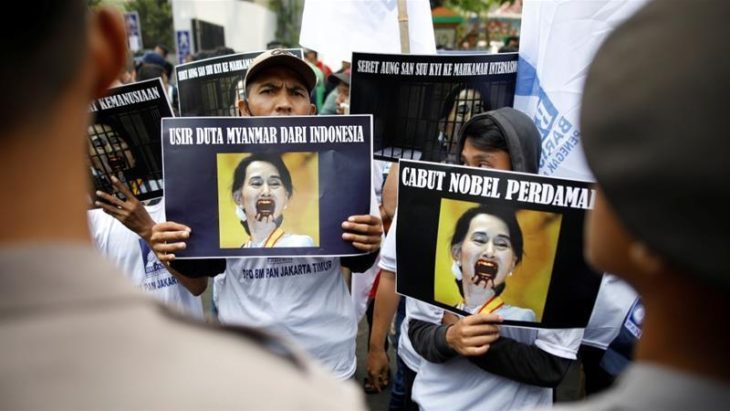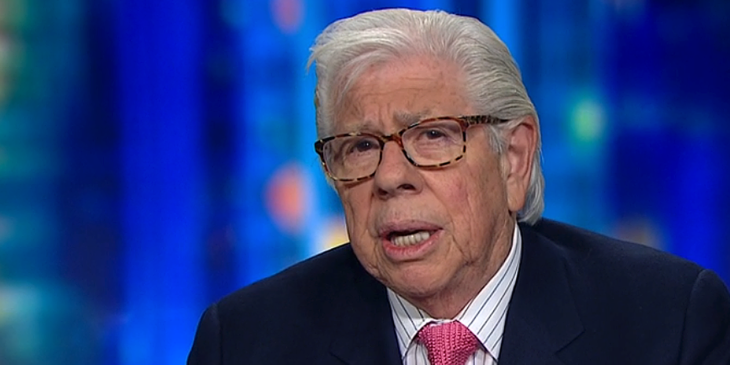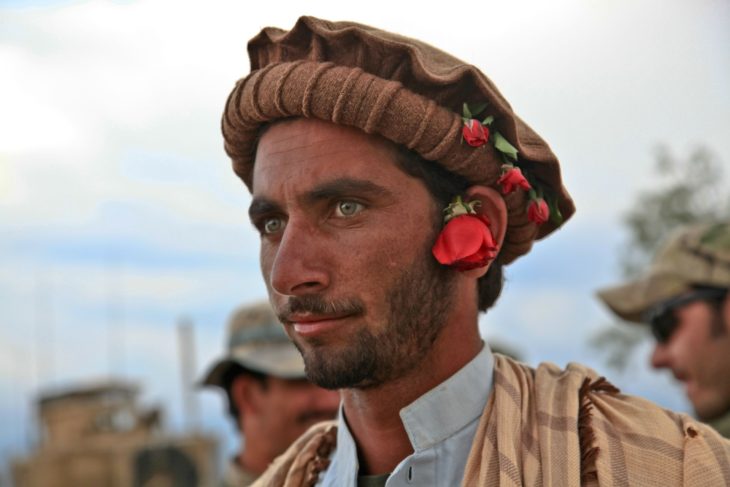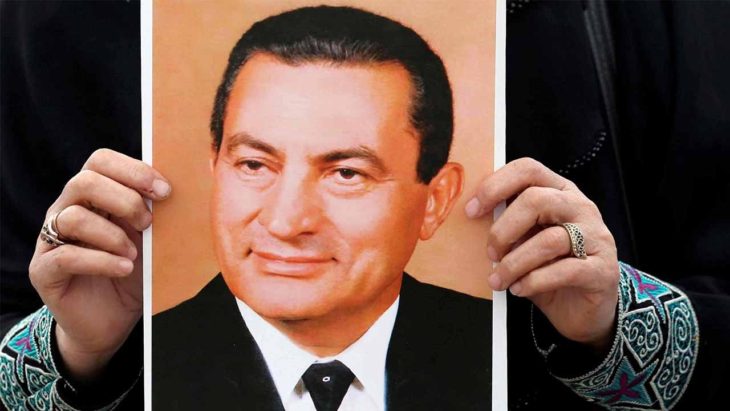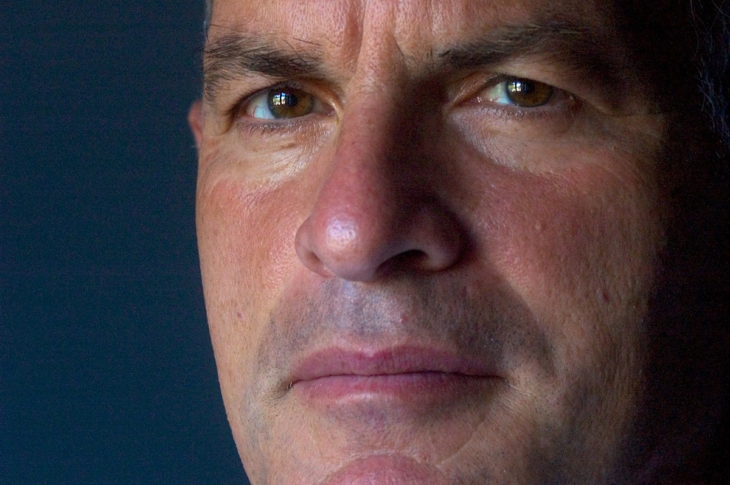To understand a local conflict today, one needs to evaluate all geopolitical forces involved. Outside powers often influence – or even dictate – national events.
In March 2021, a three-day episode of coordinated violence occurred in a small town in Bangladesh, Brahmanbaria. Approximately twenty civilians were killed, including students, farmers, shopkeepers, and a 14-year child. Many more were injured by party-affiliated militia groups, as well as police and state security forces. According to major newspapers in Bangladesh – essentially state-controlled media under strict surveillance – these people were reportedly terrorists. This is the story the government promoted.
Fabricated motives for events are not unusual in Bangladesh. Under patronage from India and China, Bangladesh’s current authoritarian government has remained in power since 2008 without a popular mandate. All elections including and subsequent to 2008 were effectively rigged. Ballot boxes were filled with fake votes. Opposition polling agents were not allowed to attend polling centers. Lives were regularly threatened.
Predatory Foreign Powers and Rising Authoritarianism in Bangladesh
Human Rights Watch has documented increasing government repression in the country. Amnesty International has obtained reports of disappearances, extra-judicial killings, and unlawful arrests and imprisonment. Corruption exerts itself at all levels of government. State apparati including bureaucrats, law enforcement, military groups, and ‘Rapid Action Battalion’ security teamsremain politicized. All are used as instruments of the ruling Awami League party, run by present prime minister Shaikh Hasina. As one can see from a well-documented Al Jazeera program, the situation remains beyond description.
Under India’s support, the Bangladesh ruling party has crushed any opposition. Any group raising their voice gets persecuted, in order to set examples for others who might follow suit. This tactic has so far worked, spreading widespread panic among the population when anyone voices protest against the Hasina government. Hundreds of thousands of groundless lawsuits are employed against dissidents. Charges are often totally fabricated. In essence, there is no justice in Bangladesh.
Torture methods were ultimately exposed, with reports released under international pressure. These included nail plucking, removal of eyeballs, waterboarding, and electric shocks to genitalia. It is thought that India’s RAW agents and Israel’s Mossad train their Bangladeshi counterparts, as they all utilize similar techniques. The US State Department’s 2020 Country Report on Human Rights Practices in Bangladesh gives insight into the troubled state of the country right now.
However, the Brahmanbaria incident merits special attention, because it occurred on a special occasion. If Bangladesh is portrayed as a hotbed of radicalized behavior to international news media, this can be used as a pretext to justify a ‘stable’ regime – regardless of how undemocratic and iron-fisted the regime may be in the real world.
On the 50th anniversary celebration of Bangladesh’s independence, an initial wave of joy and excitement quickly turned into a storm when Hasina’s government invited India’s prime minister, Narendra Modi. Modi’s anti-Muslimagenda in India – a Hindu majority country with the second-largest Muslim population in the world – earned global condemnation and resentment among Muslims in the world. The long-held desire of Modi’s BJP party to turn India into a Hindu state marked a massive shift from prior secular policies in the country. Tension and bigotry have since increased in India to an alarming degree.
People from all political affiliations and walks of life in decided to participate in a countrywide peaceful protest against Modi in Bangladesh. Brahamanbaria was just one protest location. But Hasina’s party and the Modi government subsequently spun this event as ‘extremist’ sentiment.
I was one of the members of a fourteen-member fact-finding team headed by Zafrulla Chowdhury, a renowned human rights activist known for addressing governmental dysfunction in Bangladesh. We talked to Brahmanbaria groups, including Hefazat-e-Islam members, Awami League leaders, district police, journalists, family, and neighbors. Many were afraid to speak publicly. Others informed us, often in private, that the protests were peaceful. They asserted that Awami League’s local militias attacked a Hefazat madrasa, and the local people rushed in to save it. One-sided violence had occurred, as the civilians were not armed. The police thereafter reinforced and permitted these attacks by ruling party militias.
After this event, police filed over 20,000 lawsuits against civilians, even though only 300 to 400 people were involved in the clash. The rest comprised cases against ‘unidentified individuals’. When we inquired further, law enforcement provided a ridiculous and unacceptable response. A scheme of harassment and intimidation likely occurred to silence eyewitnesses and family members. This is the way critics get crushed in Bangladesh.
Why did fire brigades fail to arrive until several hours later, when it was already too late? Why did law enforcement and state intelligence fail to take necessary precautions, knowing a difficult time was ahead during Modi’s visit? How is it possible for city services to wait hours to receive permission from ‘proper authorities,’ while important places like land registration offices and municipal buildings were burned down? It appears, irrespective of who started the arson, that authorities deliberately wanted buildings destroyed to suggest that local governments had failed to tackle extremism.
Bangladesh – A Battleground Between Two Geopolitical Giants
Specifically, India and China are interested in keeping ties with the Hasina government. Each power wants an upper hand in Bangladesh, a critical geopolitical spot in South Asia. None of these powers have any real concern for the interests and welfare of the people of Bangladesh, because they are driven by their respective predatory elites including big business, military contractors, and corrupt politicians. Both India and China are well-known for their corruption, as well as their powerful privileged class that influences neocolonial policies abroad. Elites in Bangladesh are often heavily bribed and influenced by these foreign powers, a common tactic in the modern era.
All predatory elites, whether from East or West, want an authoritarian puppet government that can deliver their respective agenda, regardless of the future of the victim country in question. The rule of law of democracy impedes their interests. Instead, they want a corrupt police state. The Hasina regime fits the ‘agent government’ model very well, which is why both China and India want the same government to stay in power regardless of their conflicting interests.
The Modi and Hasina governments use groups like Hefazat-e-Islam – groups with organizational and leadership weaknesses – to orchestrate protests with rebellious rhetoric. They then go after them with repressive measures, to demonstrate to the world, especially the West, that the Hasina regime is can maintainstability in a violent country infested with extremists. All opposition is branded as terrorists or terrorist sympathizers. This is the modus operandi in many places in Asia, Africa, and Latin America. Brahmanbaria’s events encapsulate a bigger story in geopolitics.
Bangladesh’s Pending Catastrophe – America’s Historic Opportunity
Historically, Indian RAW agents have infiltrated every level of the Bangladesh government and the state apparatus. It is difficult to distinguish Indians from Bangladeshis, as they often look alike.
Conversely, China has cash that Hasina’s corrupt government needs to survive. China’s elites have worked closely with elites in Bangladesh to push predatory loans to the government, as well as flashy projects that all end in ‘works in process.’ These efforts offload significant costs onto Bangladesh, a victimized country. Contractors become fabulously wealthy, while the Bangladeshi people pay for their corruption and mismanagement.
In return for China’s huge investments, China also wants a geopolitical advantage that would pose a severe conflict of interest for the Hasina government. Sheikh Hasina maintains close ties with India in order to stay in power, but India and China are arch enemies. Bangladesh is caught in the middle oftwo giant predatory forces that are unwilling to coexist.
A democratic government in Bangladesh could have struck a balance with China and India, just as Nepal and Sri Lanka had done in the past. But for that to occur, a functioning Bangladesh democracy is necessary, as well as a cohesive and inclusive political landscape. A nation’s spine is strong when all major political parties and stakeholders come together in consensus on ‘first principles.’ But the Hasina government has relentlessly sabotaged any attempt by varied political groups to come together into a unified opposition.
The United States is one of the only countries with enough soft and hard power to bring about a paradigm shift in a difficult place like Bangladesh. If it is actually committed to peace and justice in the world, the Biden administration can do a lot for the country. Bangladesh offers a historic opportunity for America to regain its leadership in the world.
Washington must learn from its mistakes, including the high price it paid for succumbing to predatary elites and puppet authoritarian governments. Instead, Washington should remember that helping a country to establish democracy and the rule of law earns America enormous geopolitical capital. The Marshall Plan very generously rebuilt defeated enemy governments in order to achieve freedom and democracy, which ultimately fostered staunch allies that the communist-socialist bloc could never penetrate. In the Balkans in the 1990s, America turned a highly volatile area into a stable democratic region with an mindset of peaceful coexistence. Bangladesh offers a historic opportunity for the United States to foster a peaceful balance of power. Otherwise, the nation may face a massive catastrophe, torn between two competing sides.

